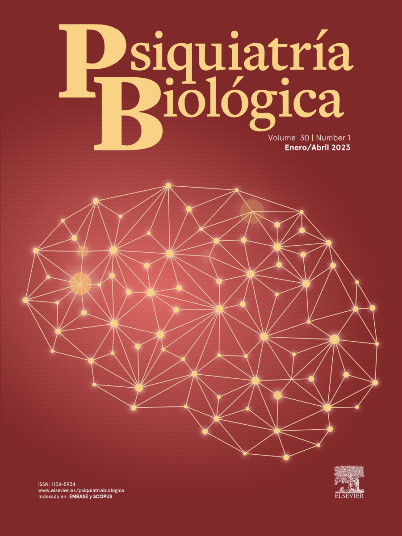se presenta un caso de síndrome de Cotard en un paciente atendido por el Equipo de Psiquiatría de Enlace (EPE) tras la resección quirúrgica de un meningioma. Realizamos una revisión histórica del cuadro y su presentación en relación con daño estructural cerebral.
Caso clínicovarón treintañero sin antecedentes psiquiátricos que presenta ideación delirante nihilista de inicio insidioso con repercusión conductual al sexto día de una neurocirugía por un meningioma frontal derecho. Descartamos clínicamente un delirium.
Resultadosse inicia tratamiento antipsicótico y ansiolítico, con reducción progresiva hasta la retirada completa al décimo día por mejoría conductual y encapsulación parcial del delirio que se mantuvo ambulatoriamente. La evolución neurorradiológica fue favorable y no presento complicaciones metabólicas ni infecciosas. En la evaluación neuropsicológica ambulatoria se recogieron dificultades cognitivas compatibles con la lesión, cuya presencia podría ser previa a la cirugía.
Conclusionesel síndrome de Cotard es un cuadro infrecuente y poco investigado que puede asociarse con daño cerebral sobrevenido. El hemisferio derecho parece tener protagonismo en la integración perceptiva y la relación con el yo, y sus alteraciones se han relacionado con la aparición de síndromes monotemáticos como el aquí descrito.
We present a case of Cotard's syndrome in a patient seen by the Liaison Psychiatry Team (EPE) after surgical resection of a meningioma. We carried out a historical review of the picture and its presentation in relation to structural brain damage.
Clinical caseMan in his thirties with no psychiatric history presented with insidious onset nihilistic delusional ideation with behavioral repercussions on the sixth day after neurosurgery for a right frontal meningioma. We clinically ruled out delirium.
ResultsAntipsychotic and anxiolytic treatment was initiated, with progressive reduction until complete withdrawal on the tenth day due to behavioral improvement and partial encapsulation of the delirium that was maintained on an outpatient basis. The neuroradiological evolution was favorable and there were no metabolic or infectious complications. In the outpatient neuropsychological evaluation, cognitive difficulties compatible with the lesion were recorded, the presence of which could be prior to surgery.
ConclusionsCotard's syndrome is a rare and under-researched condition that may be associated with supervening brain damage. The right hemisphere seems to play a leading role in perceptual integration and the relationship with the self, and its alterations have been related to the appearance of monothematic syndromes such as the one described here.
Artículo
Comprando el artículo el PDF del mismo podrá ser descargado
Precio 19,34 €
Comprar ahora







